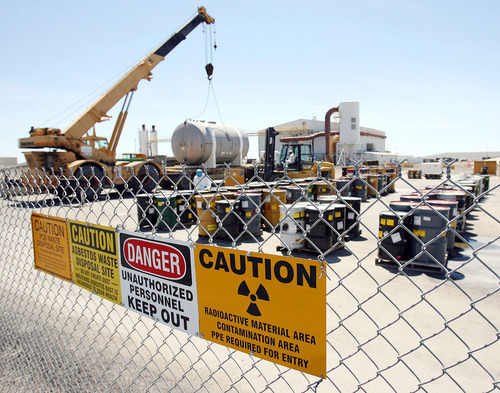This is an archived article that was published on sltrib.com in 2010, and information in the article may be outdated. It is provided only for personal research purposes and may not be reprinted.
A federal appeals court ruled Tuesday that a nuclear waste group comprised of several Western states has the authority to regulate storage of low-level radioactive waste and can prohibit EnergySolutions from importing foreign waste.
The ruling by the 10th U.S. Circuit Court of Appeals overturns a decision by U.S. District Judge Ted Stewart, who held that the Northwest Interstate Compact on Low-Level Radioactive Waste cannot regulate EnergySolutions' Clive, Utah, facility.
"It is important to remember the state of Utah conditioned the license it granted on the Clive Facility's compliance with the authority of the Northwest Compact," the court wrote in a unanimous opinion. "It is unlikely that Utah would have agreed to issue the necessary licenses if it was powerless to control the flow of waste past its borders."
The court returned the case to Stewart for further proceedings, although EnergySolutions said in July that it was abandoning its plan to import waste. Company CEO Val Christensen said Tuesday that the company would not appeal the decision, bringing the dispute to a close.
"The company is pleased that the court has now clarified its relationship with the eight-state regional compact, with which the company has had a long mutually satisfactory working relationship," Christensen said in a statement. "The court's ruling will have no impact on the domestic business the company has been doing in cooperation with the compact and the State of Utah since its inception."
Denise Chancellor, who represented the state in the litigation, said it was a "cut-and-dry" decision.
"The question was: Did the compact have the authority? And the court bought our argument and totally rejected the argument from EnergySolutions," she said.
Rep. Jim Matheson, D-Utah, who sponsored legislation to prohibit the importation of the radioactive waste, said the ruling reaffirming the oversight of the regional compacts was "great news."
"It validates what we have said all along — that Congress, together with states — always envisioned that in exchange for taking responsibility for low-level radioactive waste disposal, states would have the authority to prohibit the importation of waste from outside compact regions," said Matheson.
Mike Garner, executive director of the Northwest Compact, said that the compact was "delighted" with the court's decision.
"The compact is pleased the State of Utah, through the authority provided to the Northwest Compact, is again in a position to control the low-level waste provided access to the region for disposal at EnergySolutions' Clive facility," Garner said.
Vanessa Pierce, executive director for the Healthy Environment Alliance of Utah, said there could have been wide-ranging implications if the appeals court had sided with EnergySolutions, wiping out Utah's ability to restrict the types and volumes of waste that enter the state.
"There was a lot at stake with this lawsuit," she said. "It's a victory for states' rights and the people of Utah, because EnergySolutions' lawsuit was fundamentally designed to strip away Utah's authority over how much nuclear waste comes here and what kind comes here."
The Northwest Compact consists of Alaska, Hawaii, Idaho, Montana, Oregon, Utah, Washington and Wyoming. Congress gave its consent to the creation of the compact in 1986, and granted it authority to regulate low-level waste.
The case arose from EnergySolutions' bid to import 20,000 tons of radioactive waste from Italy, process it at a plant in Tennessee, and ship the remaining 1,600 tons to the disposal site in Utah.
In 2008, Gov. Jon Huntsman Jr. formally objected to the importation plan. According to the way the compact is structured, the host state essentially has veto power and, consequently, the compact refused to permit the EnergySolutions plan.
EnergySolutions, represented by U.S. Senator-elect Mike Lee, sued, arguing the compact lacked the statutory authority to regulate radioactive waste because the Clive waste dump was not a "regional disposal facility."
But the court rejected that argument, ruling that it was a facility covered by the compact and that, as a condition of EnergySolutions' 1991 license to dispose of waste, Utah regulators required the company to obtain permission from the compact before disposing of any radioactive waste. —
Online The court's opinion
O Read the full opinion of the 10th U.S. Circuit Court of Appeals at: http://www.ca10.uscourts.gov/opinions/09/09-4122.pdf



